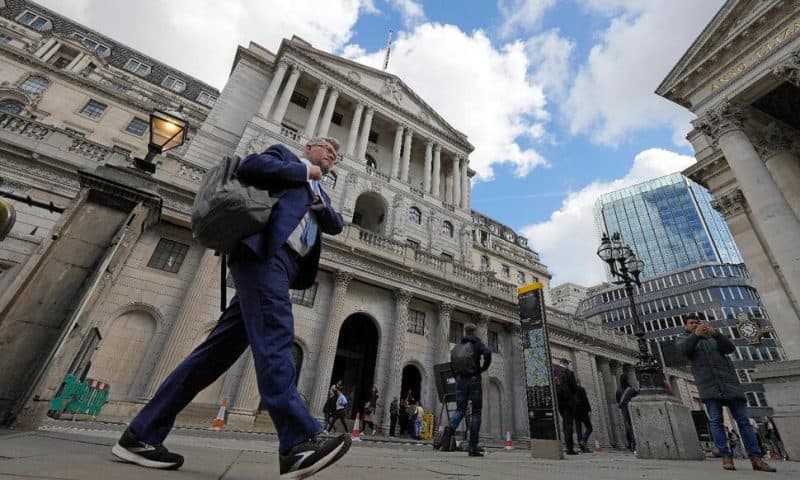The Bank of England has paused nearly two years of interest rate increases after a surprising fall in U.K. inflation eased concerns about the pace of price rises
LONDON — The Bank of England on Thursday joined the U.S. Federal Reserve in pausing interest rate increases after a surprising fall in U.K. inflation eased concerns about the pace of price rises.
In a development that few predicted just two days ago, the central bank kept its main interest rate unchanged at a 15-year high of 5.25%. It comes to the relief of millions of homeowners who are facing higher mortgage rates after nearly two years of hikes.
Central banks worldwide appear to be near the end of an aggressive rate-hiking cycle meant to curb an outburst of inflation triggered by the bounceback from the COVID-19 pandemic and Russia’s war in Ukraine. The Fed also left rates unchanged Wednesday.
Clearly influencing the U.K. bank’s decision was news Wednesday that inflation unexpectedly fell to 6.7% in August, its lowest level since Russia invaded Ukraine in February 2022. But it is still way above the bank’s target rate of 2% and higher than in any other Group of Seven major economy.
Bank Gov. Andrew Bailey said the decline in inflation was “welcome” but that the bank stood ready to raise rates again if it didn’t continue to fall as anticipated.
“We’ll be watching closely to see if further increases are needed, and we will need to keep interest rates high enough for long enough to ensure that we get the job done,” he said in a statement.
Four of the nine members of the bank’s Monetary Policy Committee voted for a hike.
Higher interest rates, which cool the economy by making it more expensive to borrow and bearing down on spending, have contributed to bringing down inflation worldwide. Though most economies have avoided falling into recession, economic growth is subdued in many parts of the world and fears remain that the British economy could start to see output shrinking in coming months.
“While the bank has suggested it could hike again if inflation proves to be more than expected, it is likely that interest rates have now peaked,” said Luke Bartholomew, senior economist at asset management firm abrdn. “The economy is deteriorating rapidly, and we expect a recession later this year.”
While the decision to leave rates unchanged is a welcome development, it doesn’t mean that Britain’s cost-of-living crisis has ended. Inflation, though lower than expected, remains relatively high, as do food and energy costs.
And because there is a lag between actual rate hikes and mortgage rates, lots of homeowners and renters have yet to see increases in their housing costs.
Unlike in the U.S., for example, most homeowners in Britain lock in mortgage rates for only a few years, so those whose deals expire soon know that they face much higher borrowing costs in light of the sharp rise in interest rates over the past couple of years.
Lewis Shaw, founder of mortgage adviser Shaw Financial Services, said the decision will be greeted with “a collective sigh of relief” across the country.
“Let’s hope they’ve not gone too far already, as over 2 million households are set to renew their mortgages at higher rates between now and the end of 2024,” he said.
The Bank of England, like other central banks, has raised interest rates aggressively from near zero as it sought to counter price rises first stoked by supply chain issues during the coronavirus pandemic and then Russia’s invasion of Ukraine, which pushed up food and energy costs. U.K. inflation hit a peak of 11.1% in October 2022.
As inflation has eased, the hiking cycle looks to be nearing an end.
The Swiss National Bank also kept rates unchanged Thursday, but in a busy day for central bank action in Europe, Sweden’s and Norway’s central banks pushed ahead with quarter-point hikes and Turkey made another large increase.
The European Central Bank, which sets interest rates for the 20 European Union countries that use the euro currency, last week hinted that its 10th straight hike could be its last.

